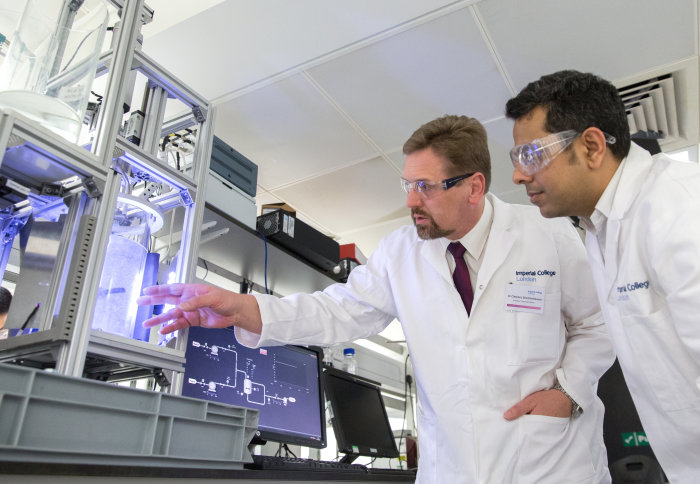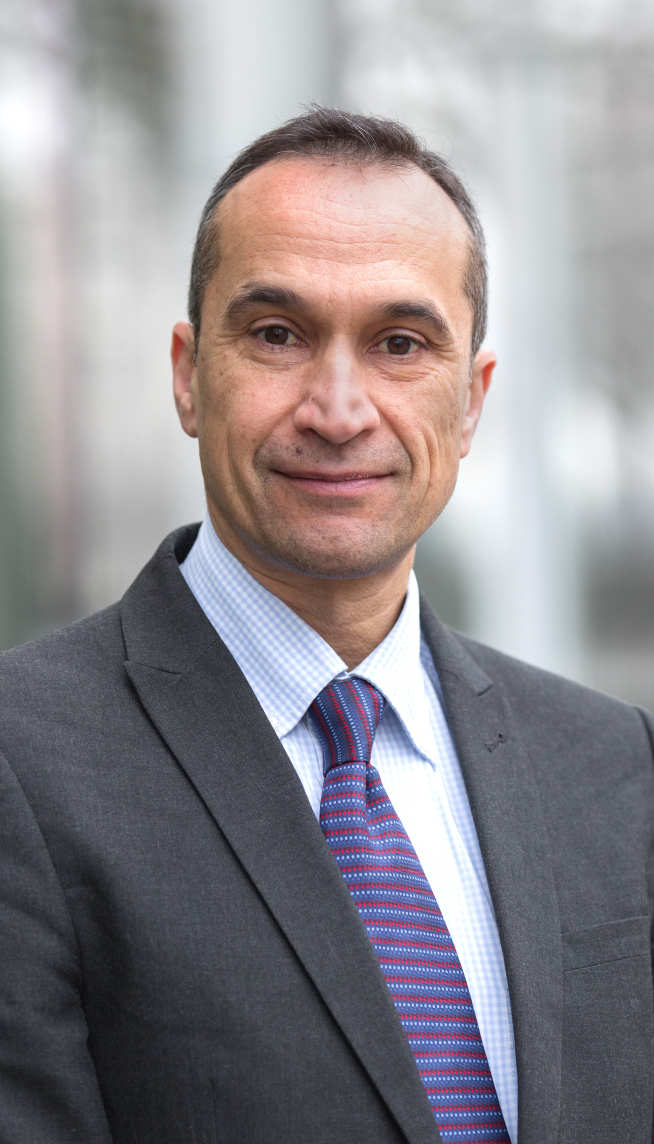Imperial announces new roles to progress world class learning and teaching

Dr Clemens Brechtelsbauer (left) becomes Imperial's first Director of Chemical Engineering Education
Dr Clemens Brechtelsbauer is first appointee to new senior role in Learning and Teaching practitioner pathway.
The trailblazing Chemical Engineer will take up the position of Director of Chemical Engineering Education and Imperial College Teaching Fellow. This new post is part of an expansion of leadership opportunities at Imperial for those who specialise in teaching and in research into higher education.
"He is an excellent and visionary educator who leverages his industrial expertise to give our students a transformational learning experience with impact potential well beyond our own sector." Professor Nilay Shah
The College has added breadth and depth to teachers' career pathways because of the importance it places on the educational experience offered to students. The new leadership opportunities also recognise achievements in the delivery of the College’s educational mission, for example developing innovative curricula and teaching, educational scholarship, and educational research and evaluation.
Dr Brechtelsbauer’s appointment accompanies the announcement that new appointees to the highest level of the Learning and Teaching practitioner pathway will adopt the title of ‘Director of [… Teaching / Education / Learning] & Imperial College Teaching Fellow, demonstrating their role in contributing to education across the College. The role titles will reflect the specific area of interest, and include ‘Education’, ‘Learning’ or ‘Teaching’, as selected by the appointee in discussion with their Head of Department.

Professor Nilay Shah, Head of the Department of Chemical Engineering, said: "I have known Clemens since his time in industry where he established his reputation by trailblazing a path for chemical engineering practice in an international company.
"It is only fitting that he is now being recognized for accomplishing a similar feat for chemical engineering education at an international university. He is an excellent and visionary educator who leverages his industrial expertise to give our students a transformational learning experience with impact potential well beyond our own sector. I am absolutely delighted that Clemens’s leadership, creativity and initiative have been rewarded with this well-deserved promotion."
Professor Simone Buitendijk, Vice-Provost (Education), said: "Dr. Brechtelsbauer has shown College-wide leadership in education innovation and much deserves to be promoted to Director of Chemical Engineering Education. I am sure he will be a great role model and a trusted colleague for many teachers at Imperial College as we will be implementing the Learning and Teaching Strategy. I am very much looking forward to working with him on transforming our pedagogy."
Dr Brechtelsbauer sat down with Murray MacKay to talk about his varied career and his hopes for the future of teaching in Chemical Engineering.
Having assumed a learning and teaching leadership role within the Department of Chemical Engineering, what are your immediate priorities for transforming the student experience?
First, we need to deliver the curriculum review. It is the main vehicle for transforming the student experience. It provides the structure and the framework for what is to follow, which is transformational change. That will happen by iteration. One important aspect of this for me has always been lightening the student workload, to give them more time to reflect and engage with wider issues so they truly take ownership of their education. The revised curriculum will open up additional choices for students to broaden their learning. It is our obligation as responsible educators to strike the appropriate balance here so that we continue to provide an educational journey that leads to a recognised qualification.
In due course you’ll be joined by several other colleagues in similar roles across the College. How have you seen Imperial’s teaching community evolve over the years?
Well, suffice to say it has changed a lot! When I joined the College in 2010 as one of the first teaching fellows my colleagues and I seemed very much to be the odd ones out in the community of academics. I think full credit has to be given to the departmental leadership at the time. They recognised the need for boosting teaching, and they actively recruited talent in that area long before the college adopted the current Learning and Teaching Strategy. Even in those early days, the Educational Development Unit was a significant pillar of support and acted as a catalyst for a lot of the changes and improvements in teaching that we now take for granted. Of course the community has changed and evolved over time, people come and go, but the pioneering spirit and the excitement for change is still with us.
Prior to joining Imperial you worked in the pharmaceutical industry for 13 years. Do you think that influences your views on what is needed in a modern curriculum?
Absolutely! As a former practitioner you have different views on what and what is not important for future engineers in comparison with a professional academic. This is normal as we all are shaped by our experiences. I put a lot of emphasis on teaching hands-on skills and what can be applied directly in industrial practice but this sits alongside quite nicely with the scientific rigour as favoured by some of my colleagues. When I worked in industry I had to design training programmes to mitigate the shortcomings of graduates' university education. Now that I work at the source, I can put the changes in place here to make our graduates more competitive for the job hunt. Because at the end of the day that is what a university education has to lead to. As I said to my two older children, “you can study whatever you want, as long as there is a job at the end”.
Like many other teachers at the College you’ve been reviewing the content of your courses and how you deliver them. Can you give some hints as to what may change in the coming years?
Modern engineering is only possible through teamwork, which is why a lot of our education has been based on problem based learning in groups for quite some time already. Going forward, we will see an even closer integration of concepts taught in lectures with those in coursework. Our students are very bright and highly motivated which means we can present them with challenges that others would find daunting. In engineering in particular, our ambition is to bring the work place into the classroom so that for example instead of using dedicated teaching experiments, our students work on equipment made out of standard industrial components but designed and built by students for use by students.
We want to prepare them for their professional careers as best we can, which involves facing uncertainty and making choices when no clear path forward is obvious. They should be able to make the right call because they are confident in their knowledge and abilities. Last but by no means least, we will include new learning technologies that will make teaching more interactive, and – hopefully – more fun for all.

Article text (excluding photos or graphics) © Imperial College London.
Photos and graphics subject to third party copyright used with permission or © Imperial College London.
Reporter
Murray MacKay
Communications Division